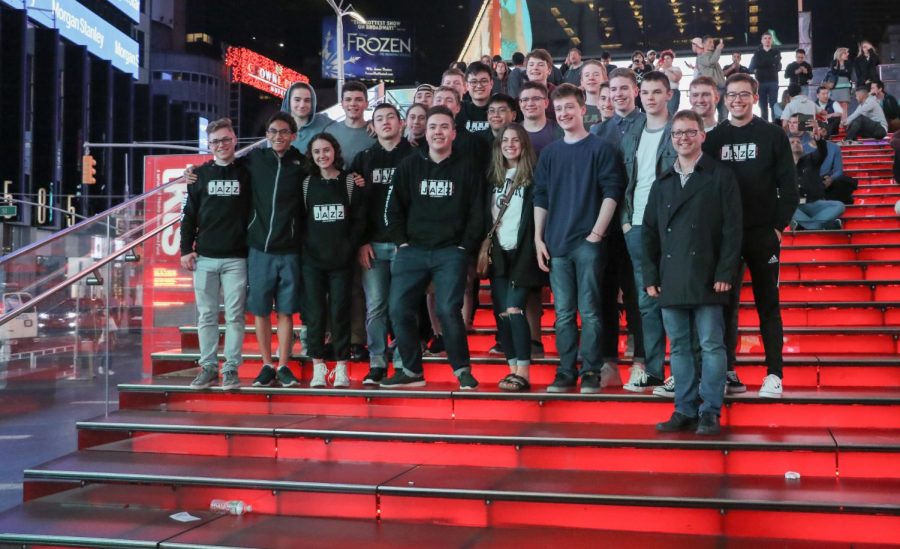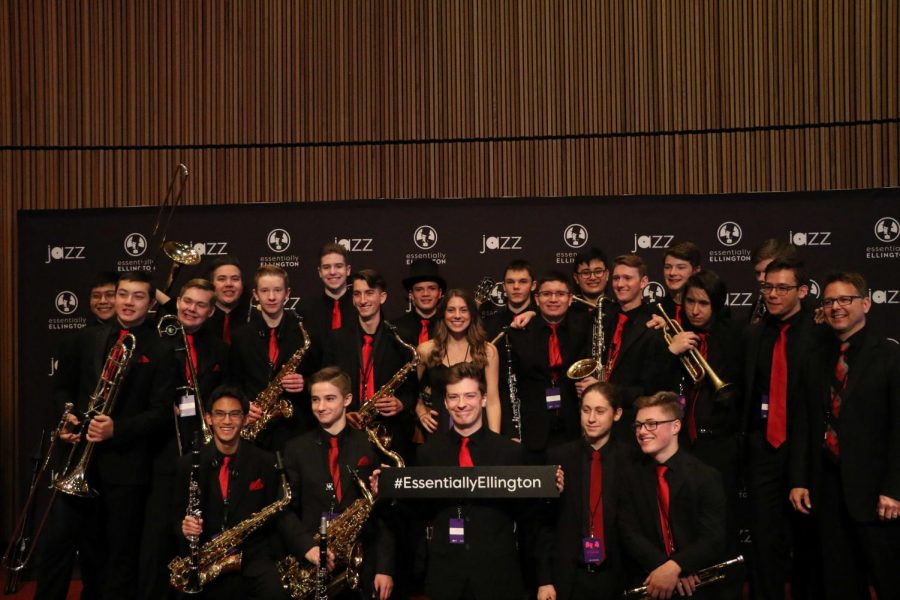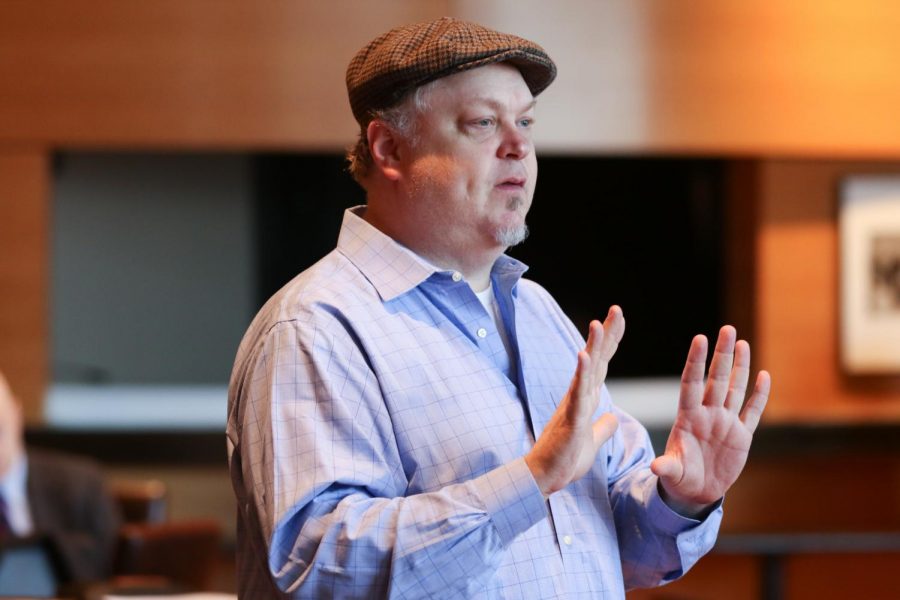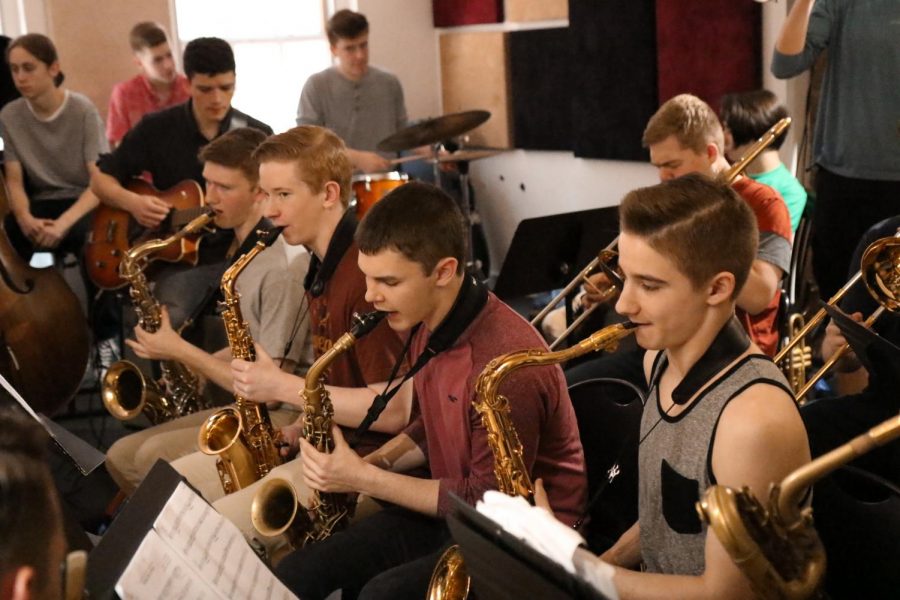In mid-May, the posters for Essentially Ellington arrived from New York, all shipped to the home of sophomore Jazz 1 trumpeter Eli Faris. Throughout the day, band members or their parents arrived as Faris set out individually wrapped posters in paper grocery bags on his driveway. After contactless pickup, every band member drove off back to isolation.
In January, when news broke that the first case of COVID-19 in the US was an Everett man, it was little more than a novelty, and Jazz 1 attended a festival along with hundreds of other people. In February, when Jazz 1 received news they’d made it into Essentially Ellington, it was unthinkable that the 25th anniversary event would ever be canceled. But in early March, Seattle schools barred field trips, eliminating two of the five bands slated to perform in Hot Java, Cool Jazz. A few days later, the Edmonds School District did the same, paring the number of performers down to one. When Governor Inslee banned gatherings of more than 250 (and later, 50) people, Hot Java was canceled for good, and MTHS ceased in-person schooling for an indefinite amount of time.
Still, many band members clung to a watery hope that Essentially Ellington would still happen. The virus, still in its nascent stages, could conceivably fizzle out by then. The flu tends to dissipate by the summer, so perhaps COVID-19 would do the same. But on March 18, the New York-based Jazz at Lincoln Center Orchestra (JLCO) announced it was canceling Essentially Ellington in-person.
The Essentially Ellington competition and festival was rescheduled for June 8 through the 12, albeit in virtual form. It was free and accessible to the public, with Q&As, seminars, awards, and performances live streamed from jazz.org/ee25.
But the event could not be the same. No trip to New York. No hotel room shenanigans, no rides on the subway, no swing dance clubs, Broadway shows, or nights at the Village Vanguard. Jazz 1, alongside 17 other bands across the globe, felt gutted.
The festival kicked off with a special video episode of “Skain’s Domain,” a podcast centered around near-mythic JLCO bandleader Wynton Marsalis. Notorious for his old-school outlook and sharply tailored suits, this broadcast featured a handful of the notable Essentially Ellington alumni. Flautist and saxophonist Erica von Kleist, bassists Philip Norris and Carlos Henriquez, trumpeters Tatum Greenblatt, Jumaane Smith and Brandon Lee, saxophonists Patrick Bartley, Sarah Milligan and Bre DeNure, and a few members of the JLCO made up the guest line up.
Marsalis, in a crisply striped Oxford and framed by his well-stocked bookcase, maintained an air of familiarity with the alumni, while nosing the conversation in the right direction in his articulate way. Past students told stories of their experiences at Essentially Ellington, described notable gigs and passed on wise words for the hundreds of students watching across the country. Bartley poked fun at the long legacy that Seattle’s Roosevelt and Garfield high schools hold at Essentially Ellington, and how they often nudged hopeful bands off the roster.
“‘It’s like a machine!’ we used to say,” said Bartley, from a corner in his home studio while surrounded by saxophones and acoustic foam. “The ironic thing is, everyone I’m playing with nowadays is from Roosevelt or Garfield.”
On Tuesday, after an award ceremony that revisited the best student solos the festival had seen in its 25 year history, a similar format was repeated with even more Essentially Ellington alumni in an at-home jam session which pushed the boundaries of Zoom to their limits.
On June 10, JLCO master saxophonist Ted Nash hosted a composition masterclass as he dissected the winner of this year’s Student Composition and Arranging contest, guitarist Leo Steinriede. The junior from Lower Merion High School, which serves a Philadelphia suburb, submitted “The Rhetorical Situation,” which drew inspiration from both Duke Ellington and Advanced Placement English Language analysis techniques. Its slightly modern take on big-band glitz and glamour had an almost waltz-y feel, and was appealing to the old guard at JLCO and to legions of high schoolers. Among them was MTHS pianist and fellow junior, Natalie Song. Her hopes of debuting her original compositions were dashed by the lack of in-person band practice, but she still eagerly tuned in.
“It was inspiring to see another kid my age have enough discipline to create a fully developed, well-thought-out tune,” said Song.
After another Q&A with Marsalis, this time featuring alumna Alexa Tarantino, it was time for what many students view as the real beginning of the festival: the Cheer Tunnel.
Prior to the Tunnel, Essentially Ellington events and seminars are merely momentary detours from typical Big Apple sightseeing. The Tunnel marks the start of student performances, and the first time students enter the Rose Theater as a part of the festivities. From that Thursday afternoon onward, students will eat, sleep and breathe jazz (well, to a further extent than the hyper-diligent students already do).
This year, instead of crowding in a hallway where every yell would project potentially infectious droplets into the air, the Cheer Tunnel occurred on Zoom. Each band, introduced by JLCO Vice President of Education Todd Stoll, behaved as enthusiastically as they could in the isolation of their bedrooms. Students banged on instruments, waved rabbits, younger brothers, cats, dogs and potted plants, launched confetti and screamed in front of school banners.
Blackburn High School, streaming from Melbourne, Australia, met in their band room as students in rugby polos and preparatory blazers formed a raucous dance circle. Edinburgh, Scotland natives, the Tommy Smith Jazz Orchestra, were conspicuously replaced by a still photo as the event took place in the wee hours of Greenwich Mean Time.
A familiar face was Triangle Youth Jazz Ensemble member Ian Rood, who attended MTHS until his family relocated to North Carolina. Many MTHS Jazz 1 seniors were looking forward to reuniting with the trumpeter who travelled with them to Essentially Ellington in 2018, and was renowned for his on-stage dance moves. Unfortunately, said reunion would have to wait.
MTHS was introduced while director Darin Faul (sporting a surprisingly lush quarantine beard) spun in his office chair, junior Andrew Vinther cha-cha’d and freshman Ryan Acheson held up a confused-looking spaniel.
A group text message sent to MTHS Jazz 1 students that read, “Great enthusiasm everyone!! Made us proud!!” immediately followed.
Next was another Wynton Marsalis Q&A, as is Essentially Ellington tradition. Junior Emily Sallee managed to snag a coveted question slot. During the Essentially Ellington Student Jam Session that followed, students were able to improvise over backing provided by the JLCO rhythm section. Seniors Ernesto Torres on trumpet and Alec Raring on trombone got some solo time, in league with students across the world.
In no time at all, the final day of the festival was upon the 18 finalist bands. The final performance, live streamed in two pieces, consisted of one recording per band and brief commentary with Stoll, the band director and two student representatives. For the festival, bands must submit recordings of three songs selected out of the curated JLCO Ellington song book. For MTHS, it was their recording of “Happy-Go-Lucky Local” that was selected to demonstrate their chops and conclude the student performances.
“Essentially Ellington has profoundly shaped who I am as a teacher, and a person,” began Faul, in his opening remarks. “It has also profoundly impacted all of my students, their families and our community in so many ways – too many to list.”
As the recording played, a photo slideshow of senior portraits, selfies and Hawkeye coverage slid by. Likes and positive affirmation poured in from the viewers on Facebook Live – some from profiles with the same surname as the students in the band, but others from complete strangers, even from across the globe.
It was a deeply meaningful experience, both emphasizing and diminishing the distance between bandmates. Photos, taken months ago, of eager students in preparation for their Ellington recordings in Justin Dicciocio clinics, in packed concert halls and in close-knit rehearsal rooms, all took on a wistful quality, rendered in black and white and framed by the Essentially Ellington logo. As the song’s figurative train slunk into the distance during a surreptitious ending, the typical ending resonance of a performance had an air of finality that hovered over the livestream. The spell was broken as the faces of Faul, Stoll, judge Riley Mulherkar and seniors Josh Setala and Ernesto Torres appeared on screen.
Mulherkar, a rising star in the world of jazz trumpeters and “all-around great guy,” according to Stoll, was snappy in character and appearance. His wavy black pompadour and navy suit contrasted against the white wall, and his remarks were upbeat and decisively delivered.
“You are making a Seattle boy proud,” the Juilliard grad said, fingers clasped as if in prayer. “This piece is impressive. It’s so large in scope; it has many different sections that each have a very different character to it. And not only are you all playing it at a high level, but you’re swingin’. From the first note to the very end, when the train’s coming to a stop.”
He complimented the shuffling groove of the rhythm section and back-and-forth of Song and bassist Vinther. He coached the trumpets to dig even further into the locomotive sound to bring out the drama of the piece.
“I also gotta give a shout out to James Speedy on trumpet,” he continued with a clipped exhale, in reference to the high-reaching range of the senior. “I wish I could do that!”
Stoll directed a question toward Faul, regarding how he had chosen this selection.
“It sort of chose us,” laughed Faul. He laid the sequence of events out succinctly. “Kids suggested it, we read it and it was like, ‘That’s fun. Let’s do that.’”
Stoll then turned to Setala and Torres, both of whom wore picture-perfect grins. They were the obvious selection in terms of student representatives. The two are practically joined at the hip and were foundational to Jazz 1’s group dynamic. Both are seriously committed musicians, but somehow were consistently at the center of band room hijinks. It’s almost tragic that they’ll be attending separate colleges come September: Setala to the San Francisco Conservatory, and Torres to DePaul, in Chicago. But there’s no doubt that their bond is the kind able to endure across the country.
Setala, always gracious, addressed Mulherkar’s comments.
“Like you said, there is so much happening,” said Setala. “We were lucky to have the fantastic mentor, Justin Dicciocio, come on out, and he was very influential in terms of what the song should sound like.”
And, with that million-dollar smile, he tacked on an anecdote. “One day, we walked into the band room and Mr. Faul was just playing train sounds on the speaker.”
Torres spoke more in regard to the truncated school year.
“Aw, man. It was so unfortunate. Because, up to that point, I felt like we had a really strong band this year and we were having so much fun playing,” said Torres. “It was just a blast and probably the most fun I’ve had all four years.”
Faul nodded along, as Torres continued.
“The band was just so much fun to work with, I loved everyone in it and it was super supportive. So, I was really disappointed when it got cut short. But, I’m still so excited to see what happens once we leave.”
And that was it. After some more congratulations from Stoll, the student performances were over. Now, only one part of the festival remained: the awards.
This year, under the special circumstances, JLCO decided to forgo the competitive aspect of Essentially Ellington, both because it would be impossible to judge without live performances, and because the 25th anniversary paired with quarantine heightened group camaraderie. This batch of attendees was more united, though apart, than any other group in the festival’s 25 year history. That meant the only awards presented would be for individuals and sections, without the typical ranking of the bands.
MTHS came away well-decorated. Jazz 1 received honorable mentions for their rhythm section, well deserved for Setala, Song and Vinther’s chemistry, and individually for Song and senior trombonist Alec Raring. Taking home Outstanding awards were Vinther for his virtuosic bass, senior Caden Hargrave for his phenomenal alto sax solos and feature and senior “doubler” Owen Moreland, because of his work on both tenor saxophone and clarinet heavily featured on “Happy-Go-Lucky Local.”
It’s difficult to swallow, but this is the end of an era. All but one of the award winners will be leaving next year – and their sounds have defined MTHS Jazz 1 for the past two years. The rhythm and trumpet section will be tossed up, with only three original members between them as the seniors graduate and Vinther leaves for the Interlochen Center for the Arts, a premiere boarding school. Also to be missed is the leadership of trombone section leader Raring, the soloing capabilities of Solomon Plourd, Hargrave, Torres, Moreland and Speedy and the invaluable ensemble work of Ethan Moore and Preston Thrush.
This band was a remarkable one, being the ninth ensemble from MTHS to advance to Essentially Ellington. But seniors always leave, this is the inevitable reality that every high school band must face. Time will only tell what lies in store for both our seniors and Jazz 1, but until then, MTHS’ participation in the first-of-its-kind 25th anniversary Essentially Ellington festival will be yet another notch in the belt of Jazz 1’s enduring legacy.





